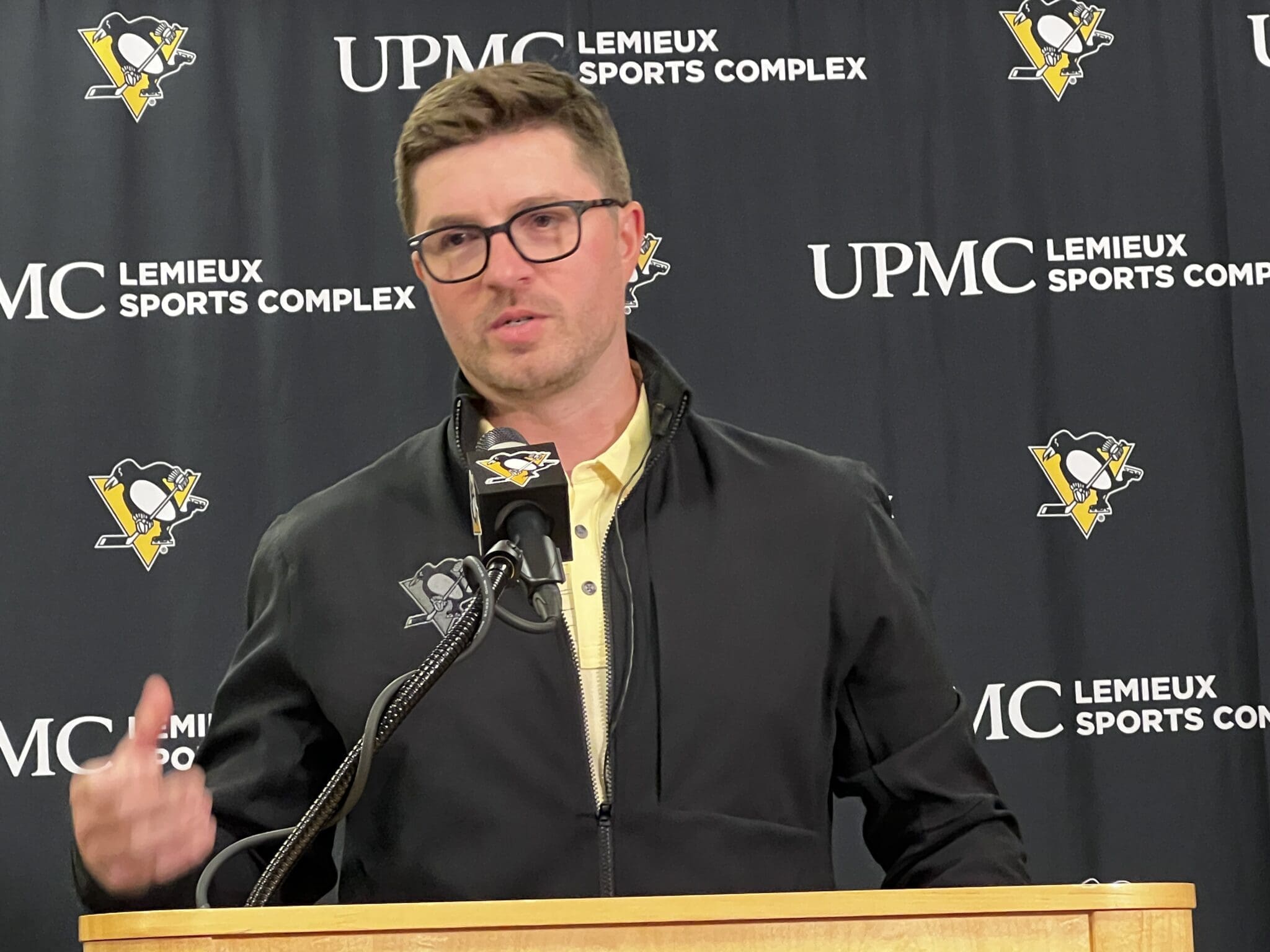Penguins
Dubas Speaks: What Tipped Karlsson Trade, Granlund Buyout Loomed

CRANBERRY — After weeks of headlines and wonder reaching its zenith in the blockbuster acquisition Sunday, Pittsburgh Penguins president of hockey operations/GM Kyle Dubas pulled back the curtain Monday on the weeks-long effort to acquire San Jose Sharks defenseman Erik Karlsson.
The trade, which jettisoned several players acquired or signed by former GM Ron Hextall, was met with rousing enthusiasm amongst Penguins fans on social media. The national analysts also credited the Penguins’ net gains.
Dubas spoke for over 20 minutes Monday and solidified his reputation as a straight talker, unafraid of questions. As part of his power consolidation atop the Penguins’ front office, which lacks a seasoned front-office veteran below Dubas, the president of hockey operations and now GM, explained his open-door policy and even invited the local hockey media to hold him accountable.
To answer the first question of would they or won’t they, Dubas strongly implied he was prepared to buy out Mikael Granlund if the Karlsson trade was not imminent.
Instead, the Penguins’ trade for Karlsson reached its conclusion a few hours before the deadline to waive Granlund for the purpose of a buyout. While Dubas didn’t (and couldn’t) specifically name Granlund, the looming Sunday deadline to clear cap space via buyout fueled the Penguins’ urgency.
Since Dubas said he does not expect winger Jake Guentzel to be on LTIR after last week’s ankle surgery, they needed to clear enough space to not only get beneath the cap but also have enough flexibility to carry an extra player for a couple of weeks in October.
“Obviously, we have to have (Guentzel) on the roster but also have other space. This happened from (Drew) O’Connor’s arbitration settlement last week. So it opened up the other buyout window,” said Dubas. “And we knew if we’re going to gain some flexibility, we have until Sunday at noon to do it. So it sort of placed a deadline on it, which I think was a positive thing for us … That’s how Jake and the O’Connor settlement collided and made Sunday at noon the deadline.”
Dubas’ aversion to swallowing a salary for twice as many years to get immediate relief was well-articulated early in his tenure, but the Penguins were out of time. Once they signed Drew O’Connor last Wednesday, that began the ticking clock. Once the buyout window closed, Dubas would have only the trade option and a weakened position to make a deal.
Instead, the Penguins moved Jeff Petry, Granlund, Casey DeSmith, and Jan Rutta. They also gave up a first-rounder to San Jose and a 2025 second-round pick to the Montreal Canadiens for getting involved.
Montreal took Petry at 75% salary, with the Penguins retaining 25%. Dubas credited Montreal GM Kent Hughes for getting involved, and it was the catalyst that allowed the Penguins to move Petry and enough salary to complete the deal.
“There were several teams involved at the end. That was the Jeff component and moving Jeff on. There were a few teams, they all had different priorities at this time and where they were at,” Dubas said. “The part we had difficulty with was (the trade) happened after free agency, so the cap being flat, there was very limited cap space for teams — you’re trying to figure out the all the machinations and the salary components that are going to work.
“(The Canadiens) wanted to jump in and try to help themselves, but they also helped us cross the (finish) line.”
Montreal was not on Petry’s restricted list, so the Penguins did not need permission.
Dubas also didn’t need permission from top Penguins defenseman Kris Letang, himself an elite D-man for over a decade and part of the Penguins’ entrenched championship core.
Dubas had the conversation, anyway.
“I’m not looking for approval. With Kris’s spot, it was, ‘This is what we’re thinking, Kris. Here’s how we see it working,’ so we have an idea for where he’s at,” Dubas said. “Unsurprisingly, with Kris, it was very clearly whatever was going to make us better and help us win.”
The Penguins now have a pair of elite defensemen filling the top two pairs, who Dubas feels can fill nearly 50 minutes per game. While that won’t leave much time for a third pair, the Penguins will open the door to professional tryout candidates and the remaining defensemen on the free-agent market.
The Penguins will spend the next couple of days assessing the market and their position, debating whether to fill the third pairing right side with outside help or stick with the current roster, in which Chad Ruhwedel would likely occupy the third pair, right side.
Just don’t expect another cannonball into the NHL trade pool to complete the Penguins’ off-season. The Penguins’ new GM sounded a note of relief as he dismissed chasing any other big names and getting his new team set for the coming season.












